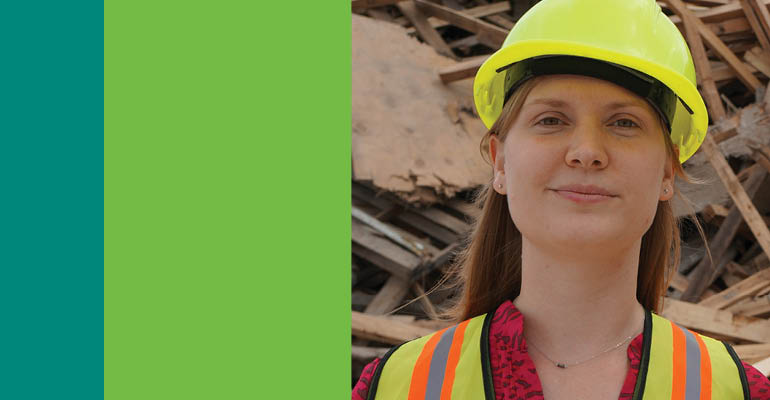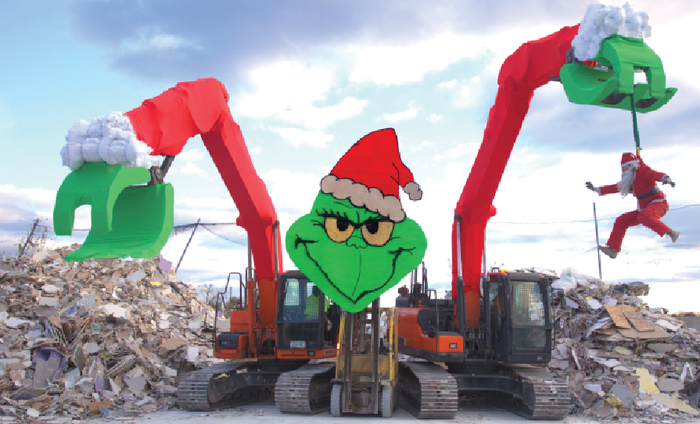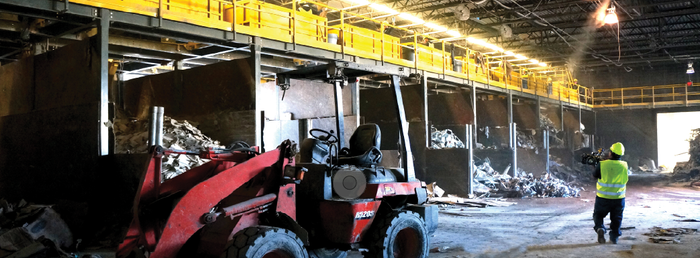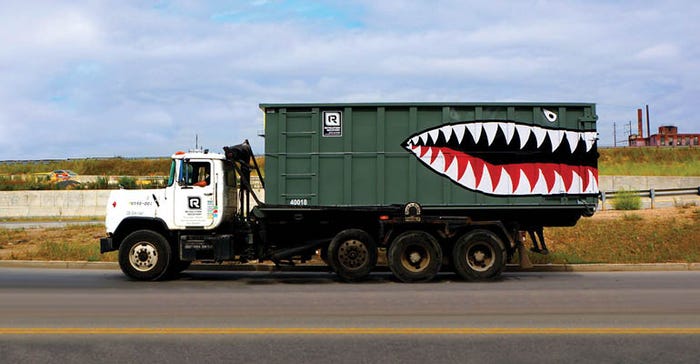The Waste360 40 Under 40 award recipient spoke with us about her roles as director of sustainability at Revolution Recovery and cofounder of RAIR.

Fern Gookin, director of sustainability at Revolution Recovery, had the chance to transform her college thesis project that focused on creating awareness around sustainable issues through art and design into a nonprofit called Recycled Artist-In-Residency (RAIR) in 2010, and she took it.
Since launching the nonprofit and joining Revolution Recovery as a full-time employee, Gookin has helped grow the construction and demolition (C&D) recycling company from one facility to two facilities and has assisted with regulatory compliance, grant writing, sourcing new and creative recycling outlets, customer retention, strategic planning, interdepartmental communication and scale software development.
“Fern has the unique gift of being able to balance championing sustainability with profitability and the competitive local market. Despite tough material markets and dropping pricing in recent years, her industry knowledge, persistence, interpersonal skills and vision have allowed Revolution Recovery to expand while maintaining landfill diversion rates and the recycling of almost all commodities,” say her team members at Revolution Recovery.
We recently spoke with the Waste360 40 Under 40 award recipient about the opportunities available to artists through RAIR, how Revolution Recovery handles the ever-changing economy and some of the responsibilities that come with her role as director of sustainability.
Waste360: How did you begin your career in the waste and recycling industry?
Fern Gookin: I went to graduate school at Philadelphia University for sustainable design, and for my thesis project, I decided to create awareness around sustainable issues through art and design. To begin my project, I reached out to the owners at Revolution Recovery because I knew they were friendly to artists and let artists work in their facility for art projects. After speaking with the owners, I found out that it was becoming harder for them to field requests from artists because their business was growing so I asked them if I could write my thesis on formalizing their art program, and they said yes.
The owners connected me with some artists, and the more I talked with people, the more people started to get excited about the concept of a formalized program. And after a while, people started telling me to take the concept of a residency program beyond the thesis paper and make it a reality. I spoke with the owners of Revolution Recovery about turning my thesis project into an actual program and, in 2010, the nonprofit RAIR was conceived.
After I graduated, I wanted to continue working on RAIR, but it was a small nonprofit at the time and I needed a job I could rely on. Revolution Recovery ended up hiring me to work for its recycling company, and to this day, I work for both the recycling company and RAIR, which is housed within Revolution Recovery.
Waste360: Tell us more about RAIR and the opportunities available to artists.
Fern Gookin: It’s a residency program where global artists apply to come to the recycling center to have access to readily available recyclable materials to create their art projects. Each year, a jury panel selects between six and eight residents to participate in the program.
Outside of the residency program, we partner with various community and arts organizations that may need source materials or some design or fabrication work done for a project.

Waste360: What are some of the responsibilities that come with your role as director of sustainability?
Fern Gookin: Revolution Recovery is still very much a small company that’s growing very quickly, and I help with the company’s overall growth. I also look at systems and help determine how the company can graduate from writing everything down on paper to excel sheets to an actual software program, and I help train different teams so that everyone is up to speed with any new systems that come online.
Additionally, I oversee our monthly Leadership in Energy and Environmental Design reports, provide our customers will information on how much material we recycle from their projects and work closely with the sales and business development teams to bring in new customers and make sure that we are delivering strong customer service to every customer.
I am also very active in the communities that we serve, and I do a lot of public speaking and facility tours to educate others about recycling and Revolution Recovery.
Waste360: You’re also the board president for the Delaware Valley Green Building Council. Tell us a little about that.
Fern Gookin: It’s our local chapter of the U.S. Green Building Council, and we are committed to advancing green building within the State of Delaware and the State of Philadelphia and its surrounding counties, which is the footprint of Revolution Recovery.
In my role as board president, I work with a group of people to make sure that there are educational opportunities and policy and advocacy issues related to sustainability. I also try to push green building efforts through in a broader sense than just C&D by representing the folks who are interested in energy, storm water and other building product manufacturers.
In addition to my role at the Delaware Valley Green Building Council, I am part of the National Association of Women in Construction, which strives to enhance the success of women in the construction industry, and other types of community organizations.
Waste360: How did you help grow Revolution Recovery from one location handling 32,000 tons per year to two locations handling 150,000 tons per year?
Fern Gookin: When I first started at Revolution Recovery, we had less than 30 people and one location. Now, we have about 90 people and two locations. To get the second location in New Castle, Del., off the ground, I helped put the request for proposal process together and attended meetings to make sure that we were meeting all the needs of the people who were requesting the opening of a C&D recycling facility.
Since opening the second location, I have been engaged as far as making sure that the information flows smoothly between both locations. So far, everything has gone pretty well, and we have worked through the challenges as they arise.

At both locations, we collect mixed C&D debris like wood, plastics, cardboard and metals from mostly manufacturing and industrial companies. The streams are pretty much the same at both locations, but they fluctuate slightly due to the facilities being in different regions.
The biggest challenge that we face at both facilities is that materials don’t always have a recycling market. In Delaware, we currently landfill about 21 to 22 of the materials that we receive, and in Philadelphia, we landfill about 13 percent of the materials we receive. We are able to create a wood-derived fuel product from some of the material in Philadelphia so that helps keep the landfill rate at that facility down.
This year, we are looking at opening a third facility, and the process of opening that facility would be similar to the process that we followed for the second facility. Nothing is 100 percent yet, but that is something we are hoping to finalize soon.
Waste360: What are some of the goals that Revolution Recovery is working toward for 2017?
Fern Gookin: We are continuing on our current path of growth. It’s difficult to grow a company because there are many moving parts, but we are working on growing the right team so that we can strengthen the company and how we are organized. Right now, it’s all hands on deck all the time, but I would like to see us mold more experts in the different areas of the company so we can continue to grow in a strong and healthy way. In addition to that, we are focusing on developing a plan for growth instead of just letting it happen, which will help us avoid some growing pains.

Waste360: How does Revolution Recovery handle the ever-changing economy and the fluctuation of commodities?
Fern Gookin: We watch the markets pretty closely and try to diversify the materials that we recycle as much as possible. If plastics are down and cardboard is up, for example, we are still hopeful that we will see positive results at the end of the day. Sometimes we have to make difficult decisions if there are materials that no longer have valuable markets, but in those cases, we try to come up with other beneficial uses for the materials.
Overall, we keep our operations pretty flexible because we know the marketplace is constantly changing, and we may need to make adjustments at the drop of a hat to keep up with those changes.
Waste360: What advice do you have for someone who is interested in having a career in the waste and recycling industry?
Fern Gookin: It’s a very interesting and diverse industry, and there are a lot of different opportunities. Waste is more interesting than what people think about on the surface; there’s a whole world of opportunity that revolves around it. To succeed in this industry, you have to put yourself out there and be open to different opportunities because the industry is always changing and you need to keep up with those changes to grow within the industry.
About the Author(s)
You May Also Like




